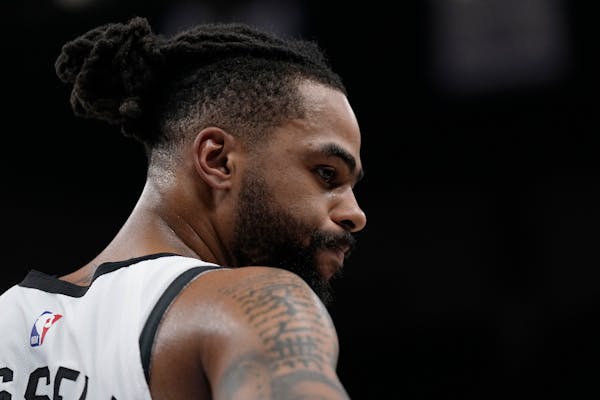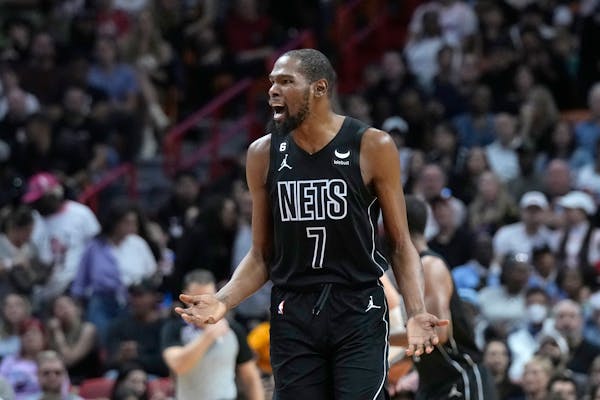In February 2020, the Timberwolves drummed up all the fanfare they could to welcome D'Angelo Russell to Minnesota. There were several dozen people from the organization to greet his plane at an airport hangar, and the next day the Wolves held a public news conference at City Center downtown to welcome him.
Former President Gersson Rosas had made it his mission to acquire Russell and swung a deal with Golden State to bring him in, convinced this was the Wolves' point guard of the future.
Three years and one day after that news conference, the D'Angelo Russell era in Minnesota was over. On Wednesday, the Wolves struck a deal to send Russell to the Lakers in a three-team trade that will bring veteran Jazz point guard Mike Conley to Minnesota, a source confirmed. The trade was not yet official before Thursday's deadline, but the teams had agreed on terms.
The other part of the trade is a pair of former Wolves — Jarred Vanderbilt and Malik Beasley, both of whom were traded together to the Wolves the day before Russell and were traded out in the Rudy Gobert deal last summer — were part of a package going from Utah to the Lakers. The Jazz are getting former MVP Russell Westbrook and a first-round pick from the Lakers.
The Wolves are also receiving Jazz shooting guard Nickeil Alexander-Walker and three of their second-round picks in 2024, 2025 and 2026. The Wolves, coincidentally, were in Utah to face the Jazz on Wednesday though neither Conley nor Alexander-Walker was available to play.
The trade will reunite Gobert with Conley, the point guard who was with him in Utah for the past three seasons as the Wolves try to maximize their roster around Gobert, Anthony Edwards and Karl-Anthony Towns. In a recent interview with the Star Tribune, Wolves President Tim Connelly said there were "plenty of scenarios" where Russell was the Wolves' point guard moving forward.
But their future will likely include having a point guard who is more facilitator than shooter, and Conley would represent that, especially as the offense shifts to featuring Edwards as its focal point.
"He has poise on the floor, he understands time and score. He's played in a lot of big games," Jazz coach Will Hardy said before Wednesday's game. "He's been in a lot of big moments as a point guard and so he's somebody that's a real stabilizer."
Conley, who is averaging 10.7 points and 7.7 assists on 8.7 shot attempts per game, has a career usage rate of 21.5%, which is lower than Russell's 27.5% mark. Usage rate represents how much of a team's possessions end with a certain player — whether shooting the ball, turning it over or going to the free-throw line. Russell is averaging 17.9 points and 6.2 assists on 13.5 attempts per game.
The streaky Russell has helped the Wolves win several games so far this season with his career-best shooting year from three-point range (39%), a number that has raised Russell's profile around the league. Conley is shooting 36% from deep and is a career 38% shooter.
Alexander-Walker is averaging 6.3 points in 36 games this season. This will be his third team in four seasons out of Virginia Tech. He will be a restricted free agent after the season.
Another reason to do the trade from the Wolves' point of view revolves around the salary slot occupied by Russell and their relationship to the salary cap and luxury tax. Russell, who is making just over $31 million in the final year of his contract, could have walked from the Wolves this summer in free agency. Conley has one year remaining on a deal that pays him $22.7 million this season and $24.4 million next season.
The Wolves are a team currently operating above the cap but below the luxury tax, and the NBA restricts teams' ability to sign free agents when a team is above the cap, but teams can make trades and swap salaries in and out while operating this way.
The Wolves would only be able to sign free agents up to the limit of the salary cap next season if Russell walked. Getting Conley preserves that salary slot for the Wolves to still operate above the cap and below the tax next season. Conley's deal would also expire right as the supermax extension for Towns kicks in and lucrative extensions for Edwards and Jaden McDaniels would begin, should the Wolves agree to new deals with both.
The Wolves would be getting the more senior point guard in the deal, with Russell about to turn 27 and Conley at 35.
"He's a smart, heady guy," Wolves coach Chris Finch said of Conley before the game. "Obviously has tremendous leadership skills. I don't think Mike's game was ever like based on being super fast or super athletic, and that tends to benefit guys as they get older when that's not what they had to rely on during their prime years."
The Wolves are punting on Russell's prime years. For as hot as he ran at times, he could also run just as cold, and if he did, he tended to be an inconsistent defensive liability.
Fair or not, one of the lasting memories from Russell's time in Minnesota will be Game 6 of the Wolves' playoff series last season against Memphis, when Finch decided to bench a struggling Russell in the final minutes of an elimination game for Jordan McLaughlin, who was making about 1/15th of Russell's salary.
At this point in his career, Russell is a known commodity. Teams know what they'll get from him on both ends of the floor. The Lakers, who selected Russell with the No. 2 overall pick in 2015, seem to be willing to bet he can provide some needed shooting alongside LeBron James and Anthony Davis despite the flaws in his game. The Wolves are trending in an entirely different direction than when Russell was acquired, and now the two have parted ways.
As the Wolves prepared for their game against Utah, some players were in the locker room listening to music. Others were working out. But for almost all of them, their stuff was strewn about their lockers, except for one — Russell.
His scouting report was still on his chair, and his stall appeared untouched, jersey hanging on the side. It will be the last time it hangs there.
The epic archery hunt at Minnesota's Camp Ripley was an annual party. Here's why it's never coming back.
![U.S. Bank Stadium - Exterior and construction images. ] US Bank Stadium - Vikings brian.peterson@startribune.com Minneapolis, MN - 06/30/2016](https://arc.stimg.co/startribunemedia/VD64MQFZSLRSXX7V62MLGPDJWM.jpg?h=91&w=145&fit=crop&bg=999&crop=faces)
Football: Hills-Beaver Creek secures spot in Nine-Player Prep Bowl

Football: Becker beats Marshall 28-7 in Class 4A semifinals

Scoggins: Vikings' Smith is 'Hitman' on field and man of many talents off


